Vodafone Group Bundle
How Did Vodafone Group Become a Global Telecom Giant?
Embark on a journey through time to uncover the Vodafone Group SWOT Analysis, a telecommunications pioneer that has fundamentally reshaped how the world communicates. From its humble beginnings in the UK to its current status as a global powerhouse, Vodafone's story is one of innovation, strategic foresight, and relentless evolution. Discover the key moments that defined the Vodafone company and its impact on the mobile industry.
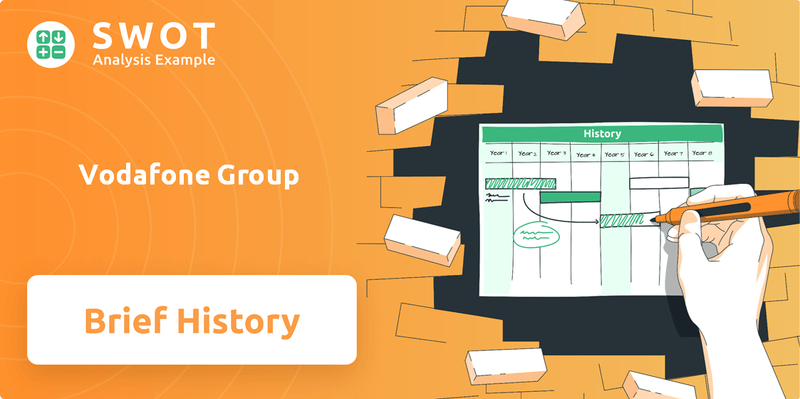
Tracing the Vodafone history reveals a fascinating Vodafone evolution, from its Vodafone origins as a subsidiary of Racal Electronics to its pivotal launch of the first UK mobile phone call in 1985. This Vodafone Group journey showcases remarkable growth and strategic adaptation, highlighting its expansion across Europe and Africa, and its significant presence in the IoT and enterprise sectors. Explore the Vodafone timeline and understand how this telecommunications giant continues to shape the future of global connectivity.
What is the Vodafone Group Founding Story?
The Vodafone history begins in the early 1980s, marking the inception of a telecommunications giant. The Vodafone Group's story is one of strategic partnerships and pioneering ventures in the mobile industry. Understanding the Vodafone company's origins is crucial to grasping its evolution and impact.
The initial groundwork for Vodafone was laid in 1980 through a collaboration involving Racal Electronics, General Electric Company (UK), and Millicom Inc. This partnership led to the establishment of Racal Strategic Radio Ltd in 1981, setting the stage for the creation of a mobile network. The subsequent formation of the Vodafone subsidiary in 1983, followed by securing the license to build Britain's first cellular telephone network, were pivotal steps.
The official unveiling of the name 'Vodafone' occurred on March 22, 1984. The launch under the name Racal-Vodafone (Holdings) Ltd on January 1, 1985, with its first office in Newbury, Berkshire, marked a significant milestone. The company's early focus was on providing mobile telecommunications services within the UK, with comedian Ernie Wise making the first UK mobile phone call on January 1, 1985, as a non-Vodafone employee.
This section highlights key moments in the early development of Vodafone, showcasing its strategic moves and technological advancements.
- In 1986, Racal Electronics issued shares to minority shareholders, making Vodafone a fully owned brand of Racal.
- Racal Telecom was demerged from Racal Electronics in 1991, becoming Vodafone Group Plc, solidifying its independent status.
- The name 'Vodafone' was derived from 'voice' and 'data,' reflecting its core offerings.
Vodafone Group SWOT Analysis
- Complete SWOT Breakdown
- Fully Customizable
- Editable in Excel & Word
- Professional Formatting
- Investor-Ready Format
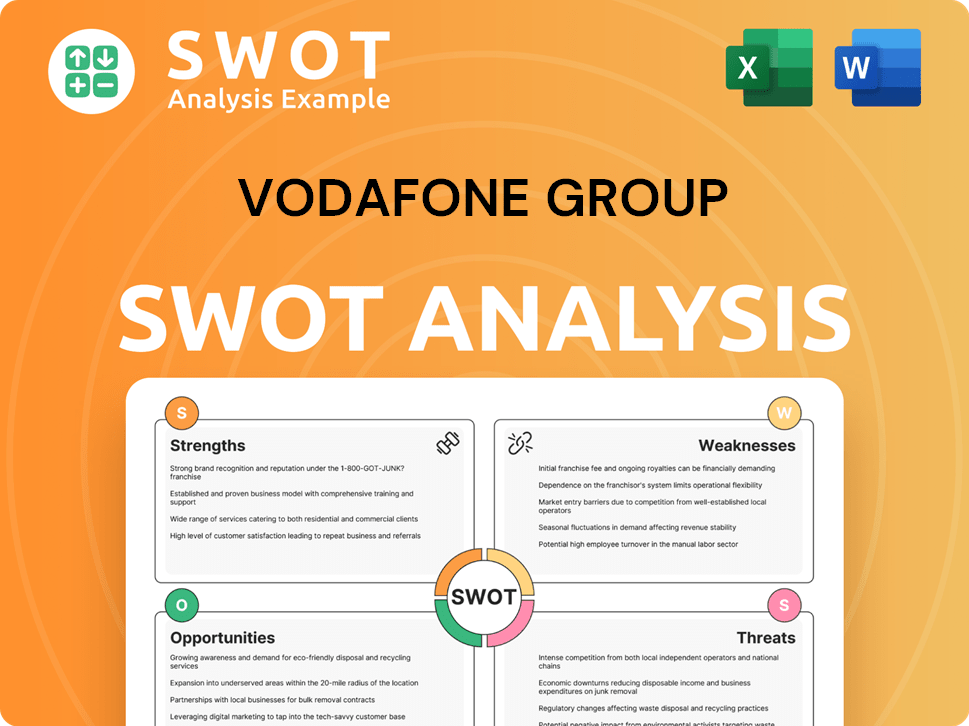
What Drove the Early Growth of Vodafone Group?
The early years of the Vodafone company were marked by rapid expansion and technological innovation. Following its demerger from Racal Electronics in 1991, Vodafone Group launched the UK's first GSM mobile phone network. This period saw strategic acquisitions and partnerships that propelled Vodafone's evolution into a global telecommunications leader.
In 1991, Vodafone origins were solidified with the introduction of the UK's first GSM mobile phone network. This technological leap forward set the stage for the company's future growth. This early move positioned Vodafone at the forefront of the mobile revolution.
The 1990s were characterized by aggressive expansion through acquisitions and strategic alliances. By 1992, Vodafone had already become the largest mobile phone service provider globally. These moves were crucial in establishing Vodafone's early dominance in the mobile market.
Vodafone didn't just focus on network expansion; it also pioneered new services. In 1994, Vodata introduced digital data, fax, and text messaging services. These innovations enhanced the user experience and set new standards for the industry.
The acquisition of AirTouch in 1999 was a pivotal moment, leading to a temporary name change to Vodafone AirTouch Plc. This acquisition gave Vodafone a significant share of Mannesmann. The merger with Mannesmann in 2000, valued at over $180 billion, was a landmark deal.
Vodafone's global presence expanded rapidly through strategic acquisitions and partnerships. The company's early focus on technological advancements and market expansion laid the foundation for its future success. For more insights into the company's strategic growth, explore the Growth Strategy of Vodafone Group.
Vodafone Group PESTLE Analysis
- Covers All 6 PESTLE Categories
- No Research Needed – Save Hours of Work
- Built by Experts, Trusted by Consultants
- Instant Download, Ready to Use
- 100% Editable, Fully Customizable
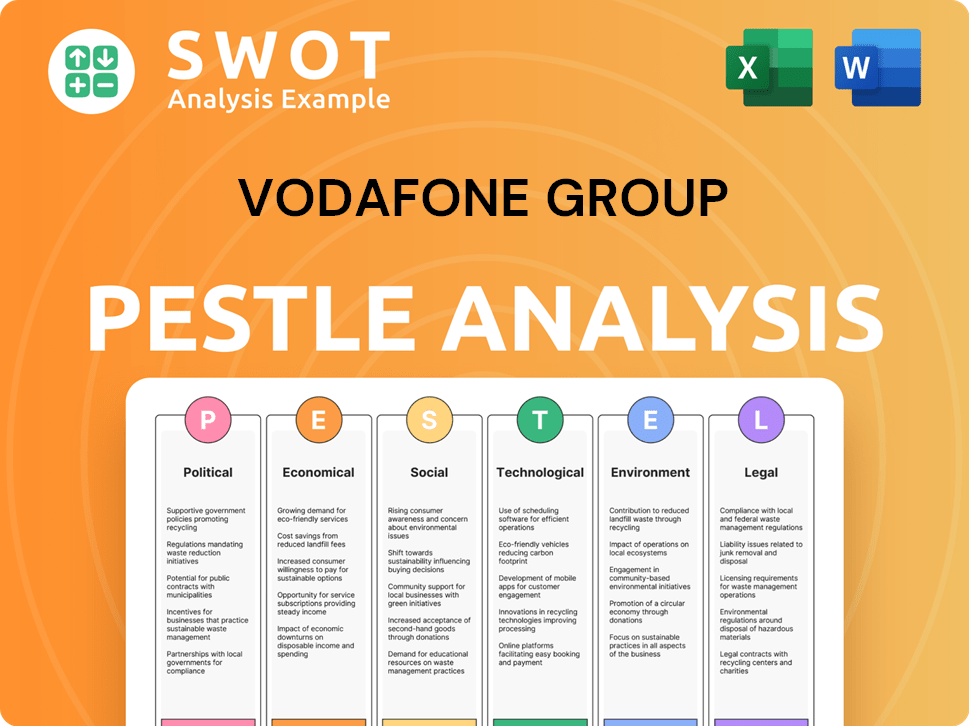
What are the key Milestones in Vodafone Group history?
The Vodafone Group has a rich history, marked by significant milestones in the telecommunications industry. From its origins to its current global presence, the company has consistently adapted and innovated to meet the evolving needs of its customers. The company has expanded significantly, achieving numerous key milestones over the years.
| Year | Milestone |
|---|---|
| 2000 | Launched its first 3G network, marking a new era of mobile data services. |
| 2024 | Vodafone IoT became a standalone company. |
| January 2025 | Completed the world's first space video call from an area of no coverage using a standard mobile phone and commercial satellites. |
| June 2025 | Completed the merger of Vodafone UK and Three UK, forming VodafoneThree. |
Vodafone has been at the forefront of several technological advancements. The company has been a pioneer in text messaging services, and continues to innovate in the field of mobile technology. Vodafone's commitment to innovation has helped it to stay competitive in a rapidly changing market.
Vodafone was among the first to launch a 3G network, which significantly improved mobile data services. This innovation allowed for faster internet speeds and better multimedia capabilities on mobile devices.
Vodafone played a key role in the early adoption and popularization of text messaging. SMS became a core service, transforming how people communicated.
In January 2025, Vodafone successfully completed the world's first space video call. This showcased the company's commitment to pushing the boundaries of mobile communication technology.
The establishment of Vodafone IoT as a standalone company in 2024 highlights the company's focus on the Internet of Things. This move allows for a more specialized approach to IoT solutions.
Vodafone Business has seen significant growth in demand for digital services, including cloud and security. Revenues from value-added services based on Cloud, IoT, cybersecurity, and Mobile Private Network (MPN) solutions are increasing.
VodafoneThree is the largest mobile network operator in the UK with 18.3 million subscribers as of February 2025. This strategic move enhances Vodafone's market position in the UK.
Despite its successes, Vodafone has faced several challenges. Intense competition, particularly in key markets like Germany, has impacted its financial performance. The company has also had to navigate regulatory changes and market shifts, leading to strategic adjustments.
In fiscal year 2025 (ended March 31, 2025), Vodafone reported a net loss of €3.7 billion, primarily due to non-cash impairment charges. This reflects the financial pressures faced by the company.
Vodafone Germany's revenue fell 6.4% in Q3 fiscal 2024-2025, largely due to increased competition. The impact of a TV law change in Germany also contributed to customer losses.
Vodafone initiated a new roadmap in May 2023 to transform the company. This included reshaping its operating footprint, such as the sale of Vodafone Spain and Vodafone Italy.
Vodafone Germany's fixed service revenue fell 10.7% in Q3. The total TV customer base declined by 66,000 due to regulatory changes.
Vodafone is progressing with a 3,100 role reduction plan in Germany. This is part of the company's efforts to streamline operations and improve efficiency.
Intense competition in Germany has been a significant challenge. This has led to revenue declines and the need for strategic adjustments.
Vodafone Group Business Model Canvas
- Complete 9-Block Business Model Canvas
- Effortlessly Communicate Your Business Strategy
- Investor-Ready BMC Format
- 100% Editable and Customizable
- Clear and Structured Layout
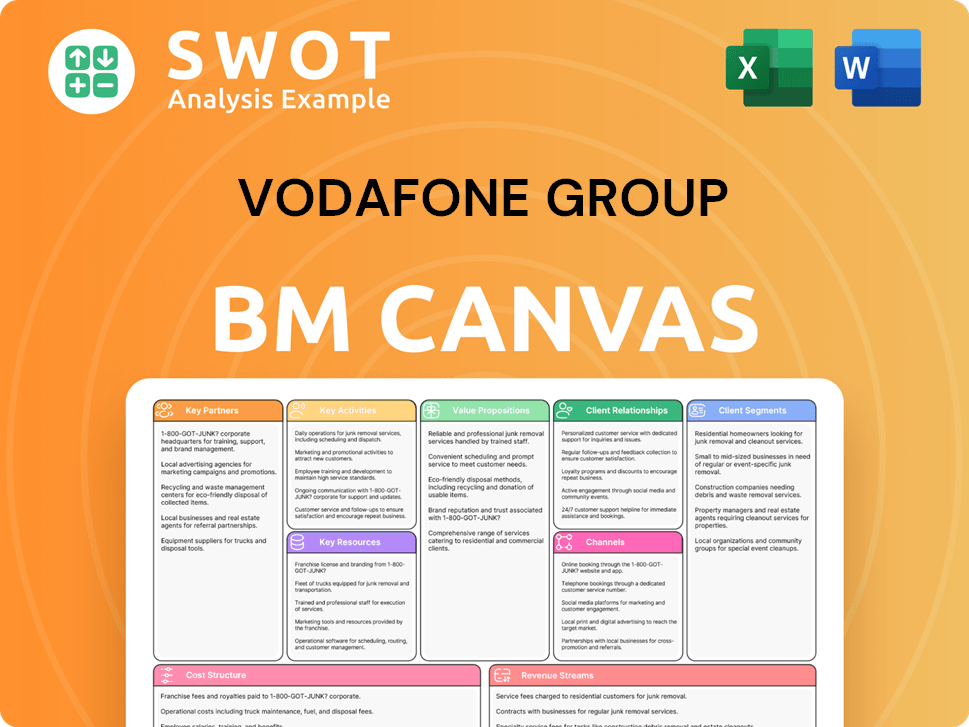
What is the Timeline of Key Events for Vodafone Group?
The Vodafone Group has a rich history, marked by significant milestones in the telecommunications industry. From its Vodafone origins in the 1980s to its current global presence, the company has consistently adapted and innovated. This Vodafone evolution is a testament to its strategic vision and commitment to technological advancement, shaping the mobile industry and connecting people worldwide.
| Year | Key Event |
|---|---|
| 1984 | A Vodafone company subsidiary was founded by Racal. |
| 1985 | Racal-Vodafone (Holdings) Ltd was launched, and the first UK mobile phone call was made on its network. |
| 1991 | Racal Telecom demerged to become Vodafone Group Plc, launching the UK's first GSM network. |
| 1992 | Became the largest mobile phone service provider globally. |
| 1999 | Acquired AirTouch and formed Verizon Wireless in the US. |
| 2000 | Acquired Mannesmann AG for over $180 billion; launched the first 3G network. |
| 2001 | Introduced the 'partner networks' concept with TDC Mobil of Denmark. |
| 2018 | Acquired Liberty Global's cable assets in Germany, Hungary, Romania, and the Czech Republic. |
| 2020 | Signed a Memorandum of Understanding for the sale of its 55% stake in Vodafone Egypt to Saudi Telecom Company (STC). |
| 2024 | Vodafone IoT became a standalone company. Vodafone Spain sale for €4.1 billion completed on May 31, 2024. Vodafone Italy sale to Swisscom for €8 billion completed on December 31, 2024. |
| 2025 (January) | Completed the world's first space video call using a standard mobile phone and commercial satellites. |
| 2025 (June) | Completion of the merger between Vodafone UK and Three UK, forming VodafoneThree. |
Vodafone is concentrating on Customers, Simplicity, and Growth. The company aims to strengthen its position in the market through these core areas. This strategic direction is key for future success.
CEO Margherita Della Valle expects the German unit to return to top-line growth in the current financial year. The Enterprise Business Unit saw a 9.2% growth in revenues from value-added services in Q1 2025.
Vodafone has set a target to achieve net-zero emissions by 2040. The company aims to power its European network with 100% renewable electricity by 2025, demonstrating a commitment to environmental responsibility.
Vodafone is investing in digital services, including cloud, security, and IoT, which are key engines for growth. The company is actively testing 5G uplink speeds, showing its commitment to technological innovation and staying at the forefront of the industry.
Vodafone Group Porter's Five Forces Analysis
- Covers All 5 Competitive Forces in Detail
- Structured for Consultants, Students, and Founders
- 100% Editable in Microsoft Word & Excel
- Instant Digital Download – Use Immediately
- Compatible with Mac & PC – Fully Unlocked
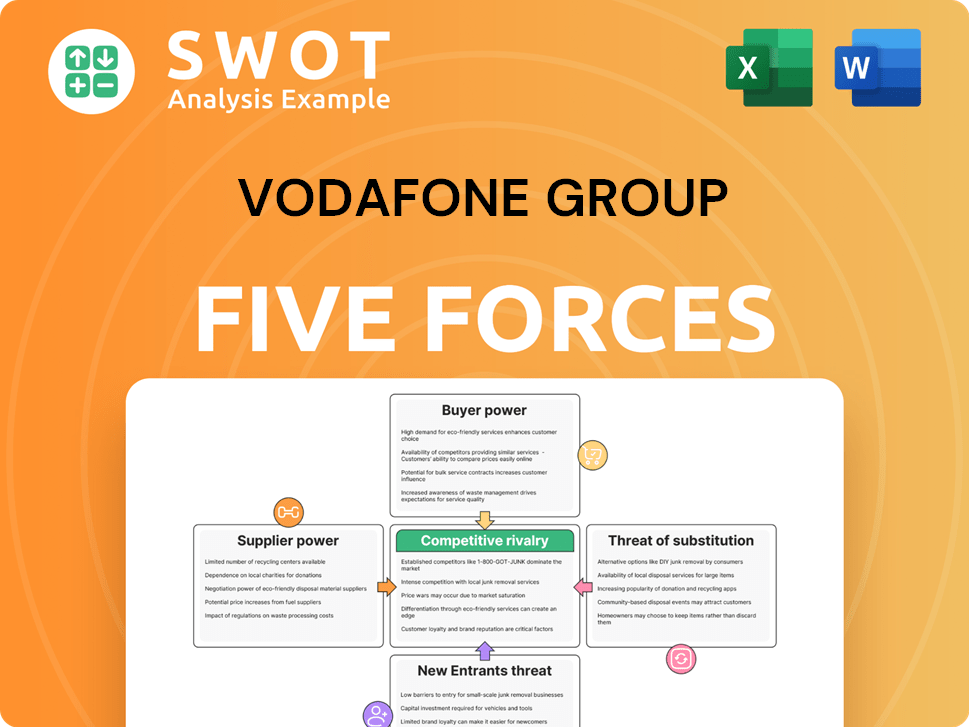
Related Blogs
- What is Competitive Landscape of Vodafone Group Company?
- What is Growth Strategy and Future Prospects of Vodafone Group Company?
- How Does Vodafone Group Company Work?
- What is Sales and Marketing Strategy of Vodafone Group Company?
- What is Brief History of Vodafone Group Company?
- Who Owns Vodafone Group Company?
- What is Customer Demographics and Target Market of Vodafone Group Company?
Disclaimer
All information, articles, and product details provided on this website are for general informational and educational purposes only. We do not claim any ownership over, nor do we intend to infringe upon, any trademarks, copyrights, logos, brand names, or other intellectual property mentioned or depicted on this site. Such intellectual property remains the property of its respective owners, and any references here are made solely for identification or informational purposes, without implying any affiliation, endorsement, or partnership.
We make no representations or warranties, express or implied, regarding the accuracy, completeness, or suitability of any content or products presented. Nothing on this website should be construed as legal, tax, investment, financial, medical, or other professional advice. In addition, no part of this site—including articles or product references—constitutes a solicitation, recommendation, endorsement, advertisement, or offer to buy or sell any securities, franchises, or other financial instruments, particularly in jurisdictions where such activity would be unlawful.
All content is of a general nature and may not address the specific circumstances of any individual or entity. It is not a substitute for professional advice or services. Any actions you take based on the information provided here are strictly at your own risk. You accept full responsibility for any decisions or outcomes arising from your use of this website and agree to release us from any liability in connection with your use of, or reliance upon, the content or products found herein.